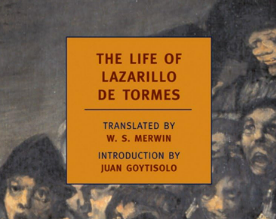Chapter X: What Happened to Lazaro with an Old Bawd
byChapter X: What Happened to Lazaro with an Old Bawd begins with a moment of desperation that drives him to accept a difficult task under harsh conditions. Weak from hunger and wearied by misfortune, Lazaro agrees to carry a trunk for an old bawd who promises him forty coppers. Although the trunk is heavy and his body frail, he forces himself to manage the weight, his thoughts focused only on food. The delivery takes him to the house of a well-fed young woman who seems too innocent to be mixed up in shady dealings. The old bawd tells her to guard the trunk while she travels to Segovia. Lazaro, though drawn to the young woman’s appearance, remains more enchanted by the coins clinking in his pocket—a rare reward that lifts his mood and makes his suffering feel momentarily worthwhile.
The next day, Lazaro returns as instructed to collect the trunk. This time, it feels oddly light, a detail he notes but does not question. He makes his way back, but a misstep on the road sends him tumbling down. The fall splits the trunk open and, to his horror, out springs a young man dressed in lavish green satin, who wastes no time escaping the scene. The sword and dagger the man carries suggest trouble. Lazaro lies stunned and injured, both physically and mentally shaken by the absurdity of the situation. He realizes too late that the trunk wasn’t just a delivery—it was a disguise, a tool for someone else’s escape, and he had unknowingly become an accomplice.
Back at the house, the discovery of the young man’s escape throws everyone into disarray. The family, caught off guard, immediately suspects deception and betrayal. While the reason for their outrage is unclear to Lazaro, it’s apparent that the presence of the young man has violated their trust and possibly their honor. Fingers quickly point at Lazaro, who lies in pain and unable to defend himself. The sons shout threats about revenge, claiming they’ll pursue the man, though none actually leave. Meanwhile, Lazaro is beaten, not just by the men of the house, but by anyone with a hand to spare. His cries go ignored, and his attempts to explain fall on deaf ears.
What makes this beating worse is its cruelty without justification. Lazaro is treated not as a person but as a placeholder for someone else’s crime. The old bawd has vanished, the young man has fled, and Lazaro is the only body left to punish. Even the servants get involved, adding insult to injury. The blows he suffers are not only physical but symbolic of how society lashes out at the vulnerable when anger has no better target. Despite having no control over the situation, he is blamed and bruised as if it were his scheme all along. This moment underlines the lack of justice in Lazaro’s world—where guilt is assigned not by truth, but by proximity.
Though his wounds eventually heal, the experience leaves him with a deeper distrust of kindness and opportunity. Even when a job appears simple, even when the coin seems guaranteed, it can all be a trap. The cruel twist of helping others only to be harmed makes him question if any goodwill exists in the world he travels. The memory of the girl, the trunk, and the man in green becomes another lesson in the unpredictability of human motives. It shows how appearances, like the locked trunk, conceal more than they reveal. And Lazaro, who once hoped for reward through obedience, finds only pain through misplaced trust.
This episode is a sharp reminder of the dangers of innocence in a deceitful world. Lazaro does not seek trouble, yet trouble constantly finds him, often cloaked in normality. His journey reflects the fragile line between service and exploitation, between hope and betrayal. The old bawd represents a figure who uses others to escape consequences, leaving the vulnerable behind to absorb the cost. Lazaro’s tale continues not because he triumphs, but because he endures, learning that survival means expecting deception behind even the kindest request. His resilience, carved from each misfortune, keeps him moving forward even when the path only leads to more wounds.

